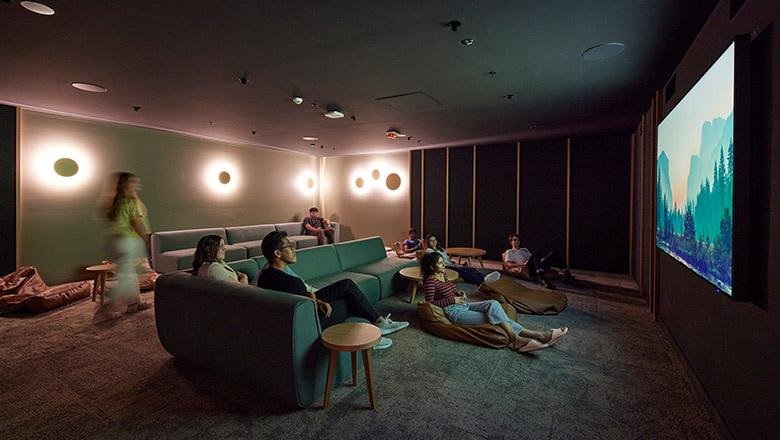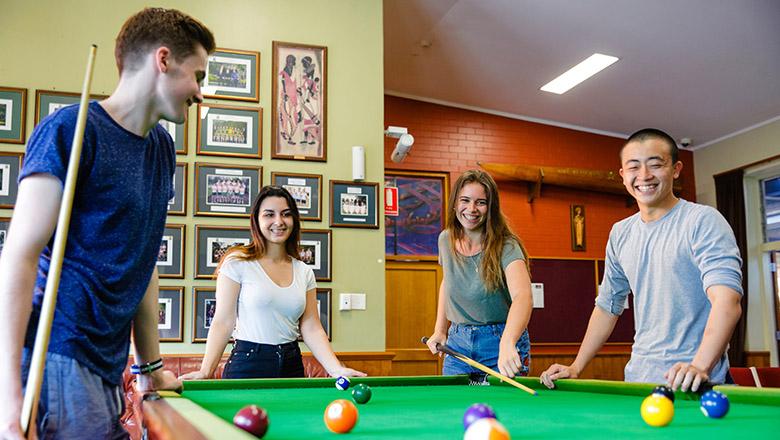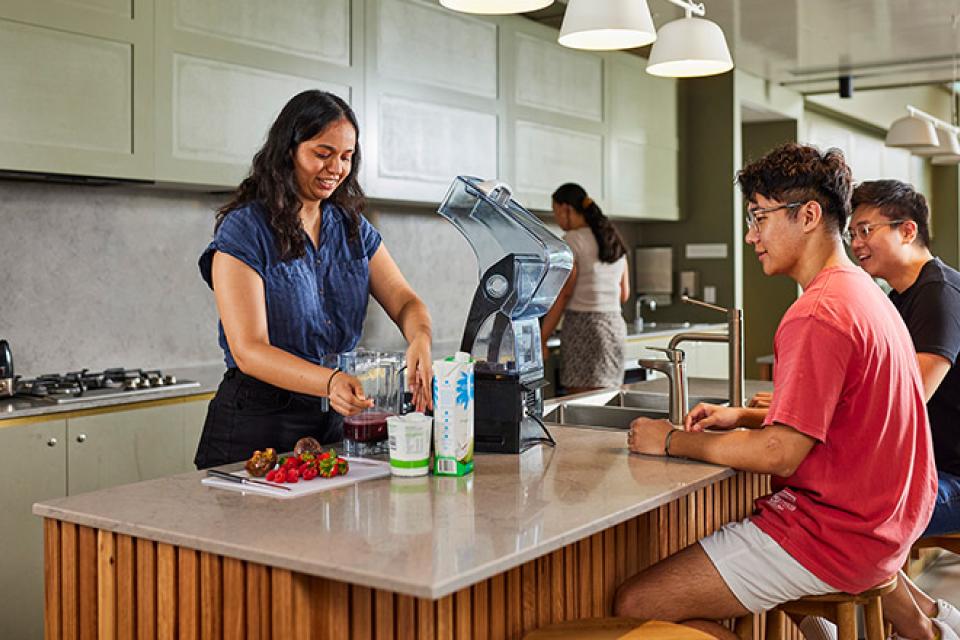So, you’re ready to pack your bags, fly the nest and start your new life as a university student – but where are you going to call home?
There’s a lot of hype around choosing the residential colleges option, but is living on campus worth it? And is what everyone says about living off campus being cheaper really true? We’re here to look at the facts, debunk a few myths and help you make a decision.
Let’s focus on the three C’s – cost, community and convenience.
- How much does it cost to live on campus?
- How much does it cost to live off campus?
- What’s the sense of community like for students living on campus?
- What kind of community is there for students living off campus?
- What’s convenient about living on campus?
- What’s convenient about living off campus?
Read up on the different types of university accommodation, how they work and how to apply for them.
Cost
When asking yourself “should I live on campus or off?” one of your main concerns will, understandably, be the cost. While living on campus may look like a higher upfront expense, it’s important to remember that most of the time electricity, gas, water and internet are included in this price. These utilities may be billed every quarter if you choose to live off campus, and they will vary in price depending on usage and whether your provider chooses to increase your rates during your tenancy. It’s worth keeping this in mind when comparing the price of living on campus to living off campus, and remember to factor in things like food, transport, cleaning and security deposit expenses.
So, is it cheaper to live on or off campus? Let’s take a closer look.
How much does it cost to live on campus?
If we take UQ’s on-campus student accommodation as an example, here’s roughly what you can expect to pay for on-campus accommodation in Brisbane.
There are 11 residential colleges on UQ St Lucia campus, all of which vary in price. Board usually includes a private room, meals and all utilities such as electricity, water and internet. This can range from $559 to $752 per week. At some colleges, instead of including fully catered meals (prepared for you and served in a dining hall) in your weekly board, you can add a meal plan as an addition, and choose how many meals you pay for (giving you more flexibility around when you eat out, and when you dine at college).
Most colleges offer a range of other add-ons for an additional fee, including parking, club memberships and O-Week activities. You can also choose to upgrade your room for a higher price – this may involve securing a room with a bit more space or an ensuite. The benefit of this system is that you can choose what you want to add on, in accordance with your budget.
Explore and compare boarding fees for all of UQ’s residential colleges.
More interested in self-catered on-campus accommodation? Aside from UQ’s residential colleges, UQ Residences also offer a more independent style of student living. A standard room at Kev Carmody House starts at $374/week and includes a fully furnished room, private ensuite and all utilities. Residents have access to a full communal kitchen with all the appliances needed to cook their own meals, plus a communal laundry to do their own washing.
When considering how much living on campus costs, remember that your weekly board will include access to all your college or residence’s communal facilities. This could include things like a pool, gym, cinema, music room, games room, study space and BBQ area. Check your accommodation provider’s website to see exactly what’s included in your weekly board – you may be surprised by just how much you’re getting!
Check if you’re eligible for a scholarship that will help you secure and pay for accommodation on campus. Browse UQ’s accommodation scholarships.

Students living at UQ's Kev Carmody House can enjoy a cinema, private gym, rooftop pool deck, makerspace, games room, music room and podcast studio.
How much does it cost to live off campus?
If you would prefer to live off campus in a share house or by yourself, you’ll most likely be looking at securing a private rental property. Some rentals targeted at students will come fully furnished and offer a set rate for utilities, included in the weekly rent price – similar to what you’d get living on campus. However, the further you look away from the suburbs and areas close to university campuses, the less likely you’ll be to find a deal like this. It also depends on the real estate agency you rent through – some specialise in dealing with students and arranging shared accommodation, while others expect you to organise everything independently.
Students can receive financial assistance from Centrelink to help out with rent and living expenses.
Here are the typical starting rental prices* for off-campus private rentals in St Lucia, Brisbane:
*These prices are estimates and reflective of the rental prices of properties searched via realestate.com in June of 2025.
- One fully furnished room in a 4-bedroom share house can start at around $250/week, not including utilities.
- A fully furnished 2-bedroom apartment can start at around $540/week. So, if you shared with a friend, you'd be paying $270/week each, not including utilities.
- 1-bedroom fully furnished studio apartments are typically on the pricier side, starting at around $450/week and not including utilities.
Here are a few important things to remember about private rentals and additional costs:
- You will need to pay a bond before you move in, which is typically 4 weeks of rent. This is your security deposit – it will be refunded to you when you move out, dependent on if you damage the property, leave it unclean or owe rent. You may be eligible for a Bond Loan from the Department of Housing.
- If you’re moving into a property that isn’t an established share house, you may need to pay a one-off fee with each provider to connect utilities.
- The cost of furnishing a rental yourself can be high – especially when you factor in white goods and appliances.
- Some rental properties require you to pay for the carpets to be professionally cleaned and sprayed for pests when you move out. You may also need to pay for a bond cleaner. Always check the terms and conditions of your tenancy agreement.
- Changing names on tenancy agreements can sometimes incur a fee from the rental agency, if you have people moving in and out of rooms in your share house during your tenancy.
You can also live off campus in purpose-built student accommodation, where you can have a private or shared room and shared facilities with students from a variety of institutions and universities.
The verdict
You may prefer to live on campus if: you’re happy to pay a little more for the security and convenience of knowing that all your bills are sorted, and everything you need is organised and close to hand (in some instances, including meals).
You may prefer to live off campus if: you believe you can save money by minimising how much you spend on rent, food and utilities, and you’re happy to put in a little extra effort to manage this, including confidently communicating with other housemates and your property manager.

Community
Why live on campus? One of the biggest drawcards is always the strong community atmosphere. Being surrounded by other students and having support services so readily available definitely has its advantages. But you may be surprised by the sense of community you can experience living off campus as a student too.
What’s the sense of community like for students living on campus?
There’s no point in denying it – there’s A Vibe, and it’s a good one. There’s always something happening on campus, which makes for a very exciting living environment. To put it simply, you’ll never get bored.
There’s also something very reassuring about knowing that if you ever get in a jam, there are plenty of other students around and support services available to help you out. Most colleges and residences will provide emotional and study support programs. Furthermore, residential colleges have dedicated Residential Assistants (RAs) on every floor, whose job is to help new students settle in and ensure everyone’s safety and security.
Residential colleges foster a very strong sense of community that comes naturally with living in such close proximity to fellow students and spending so much time with them. Long-lasting friendships are made while waiting in line for dinner, bumping paths in the corridors and staying up late studying in the communal lounge. There are also numerous sporting and social events organised by the colleges throughout the year that help students to connect, bond and enjoy their university experience.
If you’re a bit shy and hesitant when it comes to meeting new people, living on campus can really help to bring you out of your shell. There are always older students around to look out for you and show you the ropes, and social events are organised by a social committee, so all you have to do is show up and introduce yourself. Living on campus is full of so many activities that any awkwardness is soon forgotten – friends you’ve known for days will quickly feel like lifelong mates.
UQ is committed to providing a welcoming and inclusive community for a wide range of students. Kev Carmody House offers accessible rooms for students with DDA, vision impaired or hearing augmented requirements.
What kind of community is there for students living off campus?
You may have heard some people describe the experience of living off campus as isolating or lonely, but this really does depend on where and how you live. If you call a studio apartment in a suburb far removed from your university campus home, chances are you won’t be bumping into other students as frequently as if you lived on campus. But even in this situation, if you’re a super social person who loves seeking out groups to join and events to attend, you can form your own sense of community, no matter where you’re living.
Just like with on-campus accommodation, you may decide to move into a share house off campus with people you don’t know. There likely won’t be any organised activities to help you bond, but you'll still see your roomies every day, in the communal areas of the house. You can take these opportunities to get to know your housemates better and build relationships with them.
Some share houses are very welcoming little communities in themselves – it's important to read the room when you inspect the property and take the time to chat with the people living there (if you can) to see if you click. If you’re living in a rental close to a uni campus, you’ll likely be living with other students, who may be able to introduce you to others in turn. It’s about putting yourself out there and making an effort to get to know people.
Most neighbourhoods will have groups you can join and events you can attend to meet people as well. Jump on Facebook and see what’s happening around your area. There could be a book club to a join, social sports to participate in or a volunteer clean-up crew to get involved with.
Importantly, don’t forget that your uni will have an array of clubs and societies for you to join. All students are welcome at events organised by the university and can access student support services.
The verdict
You may prefer to live on campus if: you’re a little nervous about meeting people, would prefer to be surrounded by other students in the same boat as you, and feel reassured having support close by.
You may prefer to live off campus if: you’re the type of person who enjoys their own company but knows how to seek social interactions and support when you want or need them.

Convenience
When you’re studying full time and simultaneously adjusting to an entirely different lifestyle, convenience is a critical factor to consider in your university living arrangements. We’ve already touched on it in the above sections – there's certainly an added level of convenience to having your bills, meals and social activities sorted for you with on-campus student accommodation. However, if you like a bit more privacy and freedom, there are certainly convenient elements to living off campus too.
What’s convenient about living on campus?
1. You’re close to classes
As a student living on campus, the ultimate convenience would have to be that you’re a short walk away from all your classes. You completely bypass getting stuck in traffic, finding a carpark, navigating and paying for public transport and (on most occasions) running late. While this convenience is great, be careful not to fall into the trap of your life on campus becoming too insular and forgetting that people and places exist outside of university grounds. Be sure to venture out and explore all your city has to offer.
2. You don’t have to spend as much time on chores
While you may be expected to wash your own clothes and clean your own room, in most cases, on-campus accommodation will take care of cleaning communal areas such as kitchens, bathrooms and recreational areas. Some even offer a weekly bedlinen washing service. If you choose catered on-campus accommodation, you won’t even need to cook or do the dishes. This leaves loads more time for fun activities and focusing on study.
Conversely, in a share house, the cleanliness of your home largely depends on the cleanliness of your housemates, unless you’re all willing to pitch in to pay for a regular professional cleaner.
3. You don’t have to worry about paying rent over the summer
The convenience of this largely depends on your plans over the summer period (see below). However, if you always intended on moving back home over the uni break, being able to do so without having to negotiate tenancy agreements and timings can be very beneficial. It also means you can save a little money over the summer by not needing to pay rent.
If you’re applying to UQ and think you'll want to stay in your student accommodation in Brisbane over the summer uni breaks, UQ Residences (applicable to Kev Carmody House and 48 Walcott Street on St Lucia campus) have leases that run over the summer period. Conversely, the residential colleges on St Lucia campus typically require students to vacate their rooms at the end of Semester 2 and over summer break (though there are instances where you can opt in to stay over holiday periods – check the college website for more details).
4. You can rest assured that on-campus security is nearby
Like any neighbourhood, there may be parts of your university where it’s unadvisable to walk around by yourself at night for safety reasons. However, if you study late on campus and then need to make your way back to your college or residence, you can easily contact on-campus security and ask for a safety escort.
UQ operates a free after-hours safety bus that completes a route around St Lucia campus, stopping at main landmarks and colleges, from 6pm most days of the week (days differ during uni holidays). It also covers some off-campus areas around St Lucia.

UQ's Kev Carmody House provides self-catered accommodation to UQ students. The communal kitchen includes cooktops, ovens, juicing stations and personal lockable fridges and freezers.
What’s convenient about living off campus?
1. You’ll have more freedom and less rules
When you put a bunch of students in close living quarters like at a residential college, you’re going to need a few rules in place to ensure everyone’s safety and tranquillity. For some people who are used to living more independently, these rules can seem a little stifling. In contrast, living off campus in a private rental comes with more freedom – you and your housemates can agree on a set of house rules about parties, friends staying over and noise curfews, rather than having them dictated for you. Of course, if you live by yourself, you only have to contend with your personal rules.
However, you’ve heard it before – with great power, comes great responsibility. Well, living off campus is similar in that with more freedom, comes more responsibility. Having this freedom means that you need to be comfortable initiating conversations with your housemates or neighbours (who may also be your friends) when agreed upon rules are broken or their behaviour makes you uncomfortable. At on-campus student accommodation, rule breakers are dealt with by RAs, college deans and building managers, but when you live in a private rental, you and your housemates are your own (hopefully democratic!) governing body.
2. You can have more privacy
On-campus accommodation can feel a little crowded sometimes, no matter how much physical space you may have. Being surrounded by many students can get overwhelming. If you choose to live off campus, you can pick where you live, how many people and who you live with. Setting up a home with one or two mates and sharing a bathroom, kitchen and laundry with people you know may be preferable to sharing with many strangers. It also means the likelihood of you getting the house/apartment/townhouse to yourself every now and then is high. If you’re the kind of person who likes a bit of peace and quiet in your home, living off campus can definitely have its perks in this area.
At UQ, there are options for you to share an apartment with one other person or to live in a residence with a private room and bathroom. This is great for students who enjoy a little more independence and privacy.
3. You can choose to live somewhere with more space
On campus, you can choose to pay a little extra for rooms with more space, and there will certainly be communal green areas to enjoy, but it’s rare for you to ever have your own backyard, garden, patio or garage. If you’ve got a bit of a green thumb, or hobbies that require space, a larger private rental may be appealing to you. Many Queenslanders come with plenty of space under the house, perfect for recreational activities, hobby corners and storage. You can negotiate with your housemates if it’s reasonable for you to pay a little extra in rent to reserve these spaces in your share house for your private use.
4. You don’t have to move over the summer
If you don’t intend to move back home over the uni Christmas break and your tenancy agreement runs over the summer period, living in a private rental can be incredibly convenient. On-campus accommodation typically needs students to vacate residences over the summer, whereas if you have a private rental, you have the option to stay put. This is particularly useful for students who have a job in the city they’re studying in but a family home elsewhere. It means you don’t have to deal with the hassle of packing all your stuff up and moving it at the end of each year, and you can try and pick up additional shifts at your current job to save money over the summer.
The verdict
You may prefer to live on campus if: you want to maximise your time concentrating on study and having fun, rather than travelling to class, cooking and cleaning.
You may prefer to live off campus if: freedom, privacy and peace are a priority for you, and you intend on getting a casual or part-time job while you study and sticking around over the summer break.
Final word
So, all things considered, is it better to live on campus or off? We know this will make you sigh, but really, only you can decide. Think carefully about what’s important to you, bust out your pen and paper, and write a pros and cons list.
Remember to check application dates and cut-offs for university accommodation and reach out to our friendly accommodation services team if you have any questions about organising student accommodation at UQ.





